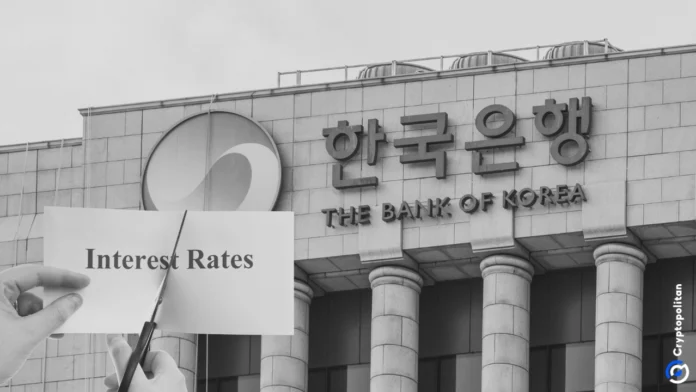Collins J. Okoth
South Korea’s central bank announced a surprise decision to cut its benchmark interest rate for a second consecutive session on November 28th. The BOK’s monetary policy committee reduced the interest rate by 25 basis points to 3%, clearly indicating the central bank’s policy focus on reviving the country’s economic growth momentum.
Thursday’s rate cut came a month after the BOK reduced rates by 0.25% to mark its first pivot since August 2021 and the first rate cut since May 2020. The BOK was responding to reducing exports and the uncertainties associated with the new Trump administration’s policy changes. Reportedly, many analysts did not expect the BOK to change the key rate in November as the won had recently slumped to 1400 won per U.S. dollar, and high household debts were still a lingering concern.
The BOK lowers economic growth projections as South Korea faces shrinking exports
South Korea’s central bank on Thursday cut its benchmark interest rate by 25 basis points to 3% in a surprise move.
➡️ Economists polled by Reuters had estimated the bank to hold rates at 3.25%.
Read the full story here: pic.twitter.com/fg2RGj14Oy
— CNBC International (@CNBCi) November 28, 2024
The BOK lowered this year’s economic growth prediction from 2.4% to 2.2% and from 2.1% to 1.9% for 2025. Next year’s projection was way below the International Monetary Fund (IMF)’s 2.2% growth projection, and the country’s potential growth at 2%.
South Korea’s local press, Yonhap, reported that Thursday’s rate cut decision probably indicated that the need to revive the country’s slowing economy outweighed the need to address the foreign exchange market’s volatility and high household debt for the central bank. South Korea’s exports, which were the country’s key growth engine, also experienced slow expansion. Although exports climbed by 4.6% from a year earlier to $57.5 billion in October, it was the least increase according to government data. The government and experts also voiced concerns over a decline in exports, especially due to Trump’s policies and tariffs.
“Exports have markedly slowed down in the third quarter, and we judged that it was not due to any one-off factor but structural factors such as heated competition in the market.”
–Rhee Chang-yong, BOK Governor
Governor Chang-Yong said the country had seen drastic changes after the meeting in October, although it was bracing for uncertainties regarding Trump’s tariffs and policies. He added that the Republican party’s ‘red sweep’ and Trump’s win were beyond the South Korean government’s expectations.
The BOK prioritizes economic growth over currency and inflation concerns
The Bank of Korea was concerned that the downward pressure on the country’s economic growth had ‘intensified.’ It said it would focus more on reviving the slowing economy even though the foreign exchange market experienced heightened volatility.
Chang-Yong confirmed that South Korea had sufficient foreign reserves and was well-equipped to handle any issues regarding volatility in the foreign exchange market. He vowed to use all available measures to stabilize the market whenever the need arose. The BOK stated that the global economy faced increasing growth and inflation uncertainties driven by expectations of policy changes in the incoming Trump administration.
According to Yonhap, BOK’s rate cuts came during a time of low inflation. In October, consumer prices increased at the slowest rate in 45 months. Notably, the prices rose 1.3% from a year earlier but stayed below 2% for the second consecutive month. The BOK lowered its expected inflation rates for 2024 from 2.5% to 2.3%. It also lowered 2025’s estimate by 0.2% to 1.9%.
A Step-By-Step System To Launching Your Web3 Career and Landing High-Paying Crypto Jobs in 90 Days.
